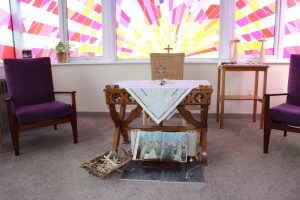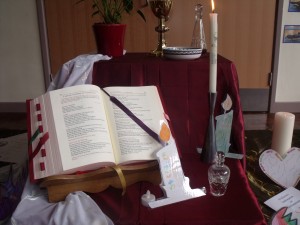Religious Education
At Our Lady Immaculate Catholic Primary School, we teach our Catholic faith through the “Come and See” Catholic Religious Education Programme in years 5 and 6. In Early Years and Years 1, 2 , 3 and 4 they follow the new Religious Education Directory programme of study- ‘To Know You More Clearly’.
Come and See
At the heart of the ‘Come and See’ programme is the mystery of God’s self revelation of love through Jesus Christ. “Come and See’” gives the pupils the opportunity to explore the mystery of faith through Scripture and our Religious Tradition.
Central to the programme are these three questions:
- Where do I come from? Life – Creation
- Who am I? Dignity – Incarnation
- Why am I here? Purpose – Redemption
“Come and See” helps our pupils to explore the beliefs, values and way of life that our Catholic faith asks of us.
It supports the faith experience of all children because it starts with their real life experience and leads them to reflect upon the meaning of church, sacraments and the person Jesus in their lives.
Pupils are encouraged to develop their faith by regular prayer in class, Collective Worship, Reflection, celebration of Masses and other religious and liturgical celebrations throughout the year. They are also encouraged to reflect upon social and moral issues, which affect our immediate and global communities.
Throughout their school journey, each pupil will be given the opportunity to experience and explore a range of different faiths and religions, as part of the RE curriculum.
We believe that the aim of religious education is to contribute to the development of the children as individuals and valued members of society. Our principal task is to help children to know, understand and appreciate the spiritual and religious dimension of life as expressed in the Catholic faith tradition and important aspects of other traditions.
We endeavour to do this by giving pupils opportunities to develop spiritually, morally, intellectually, emotionally and physically, towards their full and unique potential, in the sight of God.
This can be identified in all our work in school but most of all in the relationships which exist within the school. We value others for themselves, not only for what they have or what they can do for us. We value relationships as fundamental to the development and fulfilment of ourselves and others and to the good of the community. This can be seen in policies such as Behaviour and relationship, PSHE, Equal Opportunities and the SEND policy. It can also be seen in the work done in Relationships Health and Education (RSHE).
As a Catholic Community we believe that our faith and catholic values, which we hold dear, should have an affect on all aspects of school life, not just curriculum, but also personal relationships, manners, social development etc. It should also affect the conduct of wider school activities: celebrations, anniversaries, festivals, problems and complaints. In this way we wish to promote an awareness of the spiritual significance of all aspects of daily life including the gifts, talents and personalities of both children and staff.
New Religious Education Directory ‘To know You more clearly.’
This is the new programme of study, a model curriculum, being taught in Primary and Secondary Schools. It is linked to the Catholic Liturgical Year with a six Branch structure, one Branch per half term. The Branches are as follows:
- Creation and Covenant
- Prophecy and Promise
- Galilee to Jerusalem
- Desert to Garden
- Ends of the Earth
- Dialogue and Encounter.
In 2023 -2024 ‘To know You more clearly’, was rolled out from EYFS to Year 3. Year 4 and Year 5 will begin teaching in September 2025 and Year 6 will begin teaching it the following year.
| Year Group | Began teaching |
| EYFS | January 2024 |
| Year 1 | June 2024 |
| Year 2 | June 2024 |
| Year 3
Year 4 |
September 2024
September 2025 |
All staff receive training before their teaching time begins, to enable them to explore and understand the new content and style of delivery.
Each Branch has expected outcomes that indicate what pupils are expected to know, remember, and be able to do, using the language of the ways of knowing and applying it to the discrete knowledge within each lens. There are four knowledge lenses, which are:
Hear (Section 1 of Part 1 of the Catechism),
Believe (Section2 of Part 1 of the Catechism),
Celebrate (Parts 2 and 4 of the Catechism) and
Live (Part 3 of the Catechism).
The names of these four lenses reflect the language of the Catechism itself which states that the mystery of faith which we hear and receive requires us to ‘believe in it’, to ‘celebrate it’ and to ‘live from it’. These lenses are used to deliver lessons and support pupils’ learning.
Journey in Love – Relationship, Sex and Health Education (RSHE)
We believe that relationship, sex and health education (RSHE) goes beyond the biological knowledge of sex and the importance of personal hygiene; it also has moral, legal, cultural and ethic dimensions. We want to help the pupils at our school make informed choices, to understand and deal with their emotions and experience healthy relationships within the ethos and principles of the Catholic Faith.
OLI summary grid for Religious Education and Journey In Love
Spiritual and moral development 2026
Assessment
Religious Education is central to all we do at our school. We feel that it is essential therefore, to ensure consistently high standards in this subject, in all key stages. To ensure this, we have a clear and cohesive assessment system.
Assessment in Come and See is related to the skills, concepts and attitudes to be developed through the exploration of themes and the learning outcomes of each topic. It establishes what pupils know, understand and can do. It does not assess Faith or the practice of Faith. Assessment in ‘Come and See‘ emphasises a wide range of achievement.
Informal assessments can be made throughout the year, where teachers will observe pupils undertaking a range of tasks, engage in pupil/teacher dialogue, scrutinise pupil’s work and observe pupil’s interactions with others as well as their contribution to the wider life of the school and our parish community. Progress is recorded in order to plan for next steps for learning using the appropriate driver words.
Attainment Target 1 Driver words-Learning about:
- Recognise
- Describe
- Give reasons
- Show understanding
- Identify and explain
Attainment Target 2-Learning from
- Talk about
- Ask
- Make links
- Engage and respond
- Explain
Formal assessments occur termly throughout the year and are moderated within school. Each theme is formally assessed twice throughout Key Stage 1 and Key Stage 2. An activity will be undertaken which enables pupils to show how they have met the Learning Outcome.
The Oratory
Our school has a small chapel/Oratory. All members of our community are very welcome to come and use the Oratory for prayer and reflection.
The Oratory can be used for Mass, attended by staff, children and visitors to our school. It is also a special place that is used to prepare children for sacramental preparation, worship, and supports the spiritual development of staff and children.
The presence of the Blessed Sacrament is in the Tabernacle and we educate the children and give them a sense of reverence and respect.
At times of celebration, thanksgiving, stress, loss, bereavement…children and staff share their prayers and intentions within our school community through our Prayer Intentions Book which is kept in the Oratory.
Sacramental Preparation and Parish Links
Preparation for the Sacrament of Reconciliation and Eucharist are in integral part of “Come and See.” Work begun in the Reception class is deepened and developed throughout our school.
We also support our parents with a family Baptism Programme which is a partnership between our home, school and parish families. This programme has also been very successful.
We work very closely with Father Richard and our sister schools.
The Wednesday Word
“The materials produced by The Wednesday Word are already used extensively
throughout the dioceses in England and Wales – bringing remarkable graces to many.”
Cardinal Vincent Nichols. President, Catholic Bishops’ Conference of England and Wales.






